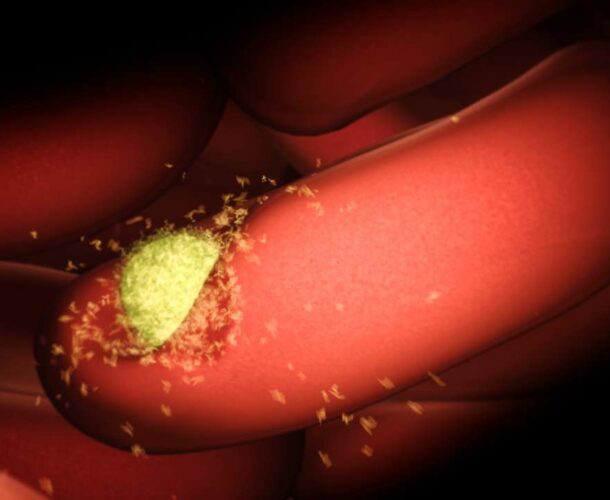Researchers identify a key protein used by the malaria parasite to transform human red blood cells, ensuring the parasite’s survival1.
Their discovery means researchers have a clear target against which to develop a new class of anti-malarial drugs that destroy the parasite.
A global challenge
Each year more than 250 million people contract malaria, and more than 800,000 people, mostly children, die from the disease. The most lethal form of the disease is caused by the parasite Plasmodium falciparum, which invades red blood cells and drastically modifies them so it can survive.
A skilled remodeller
The parasite remodels the red blood cells by exporting hundreds of so-called ‘effector’ proteins into the cytoplasm of the red blood cell. These effector proteins allow the parasite to survive in humans and hide from the human immune system.
Dr Justin Boddey, Professor Cowman and collaborators identify a protein called Plasmepsin V as being essential for effector proteins to be exported into the red blood cell.
Their research is published in the journal Nature.
Possible drug target
Experimentation shows that the action of Plasmepsin V on the effector proteins is the first step in priming the proteins to be exported beyond the parasite’s membrane into the red blood cell cytoplasm.
Cowman says Plasmepsin V is responsible for determining that all the hundreds of effector proteins are exported. “If we could find drugs to block Plasmepsin V the malaria parasite would die,” he says.
Because Plasmepsin V is a protease it is an attractive drug target.
Drugs that target proteases have been very effective in combating HIV so, by analogy, drugs that impede the function of Plasmepsin V should also show promise.
1 Boddey JA, Hodder AN, Günther S, Gilson PR, Patsiouras H, Kapp EA, Pearce JA, de Koning-Ward TF, Simpson RJ, Crabb BS, Cowman AF. An aspartyl protease directs malaria effector proteins to the host cell. Nature. 2010 Feb 4;463(7281):627-31.






